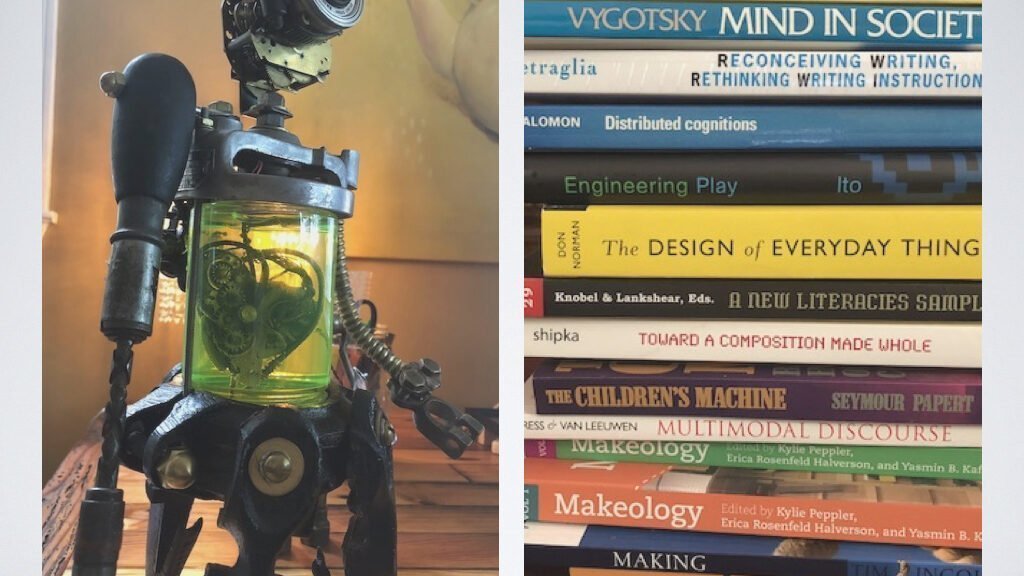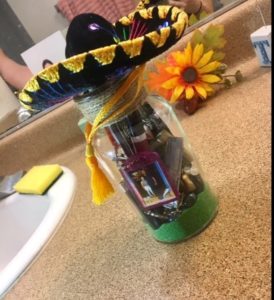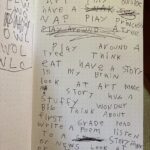
Tracing Your Literacies
Weeks 1-3: Aug 22-Sept 7
Tracing Your Literacies
- Aug 22: first day of class: prep for data collection
- Aug 24: read and annotate in Perusall: Sylvia Scribner’s “Literacy in Three Metaphors”
- Aug 22-29: keep track of your reading and writing for 2 days; bring your notes (data) to class Aug 29
- Aug 29: bring your notes (data) to class
- Aug 31: read and annotate in Perusall: David Kirkland’s “The Skin We Ink: Tattoos, Literacy, and a New English Education”
- Sept 5: labor day. campus closed
- Sept 7: write a short paper that explains what you learned about your reading and writing habits from keeping track (peer feedback in class)
Data Collection: Your Literacies
As best you can, keep track of your reading and writing for 2 days between Aug 22-29. This will be challenging. You might keep track by taking a photo every time you switch from one literate task to a new one: from email to reading for class to watching/reading something on YouTube. Or you might keep a journal handy (digital or pen/paper). As you’re tracing what you read and write, keep some notes about purpose and the context in which the reading and/or writing is situated (on the couch, in your room, at a desk). Try to keep track of time, the kind of device you use (are you reading/writing on a tablet–what about audio books or podcasts; do those count as reading?–phone, laptop, book, paper…) etc.
Once you have notes or a list, consider these questions for our class conversation: How did you decide what to keep track of? What questions emerged as you tried to decide what to record? What did you learn about your reading and writing habits from tracing those two days? What was left out? Do you think what you decided to trace is a representation of you as a reader/writer? We’ll reflect on what we learn together from tracing our literacies.
Aug 29: bring your data (your notes and/or images) to class
Part II:
OPTION 1: Literacy Narrative: working with data (paper)
 You’ll use your notes/data/images to write about what you discovered about your reading and writing practices.
You’ll use your notes/data/images to write about what you discovered about your reading and writing practices.
Questions you should address in this paper:
- How did you decide what to keep track of?
- What questions emerged as you tried to decide what to record? What was left out?
- Do you think what you decided to trace is a representation of you as a reader/writer? What did you learn about your reading and writing habits from tracing those two days?
Our goal: make sense of the data you collected about your reading and writing.
Example papers from previous semester:
OPTION 2: Literacy Narrative: autobiographical (paper)
Our goal with this paper option is to learn a bit about everyone’s access to various language communities and our initial thoughts about language. You could think of this as a language and literacy autobiography.
Some questions to address in this paper:
- What are your earliest memories of learning to read and write?
- Does your family speak a language in addition to English at home? Does your family only speak in a language other than English at home? Do you speak a variety of languages? When do you decide to use different languages? Have you ever been cautious about when to speak in one language over another?
- What have been your experience with literacies in school? How have your reading and writing practices been shaped by school?
These questions are meant to be helpful, so you certainly do not need to answer all of them. Perhaps take a few that are productive to write about.
Our overall goal for either option: get a sense of your experiences with language and literacy. What have been your experiences with reading and writing inside and outside school? You might also combine the two options: talking about your history with reading and writing and then zooming in on the data collected.
Sept 7 (before class): Share paper with me as google doc: kjaxon@mail.csuchico.edu (*NOTE: email slightly different for sharing in google than my regular email.)


 Website:
Website: